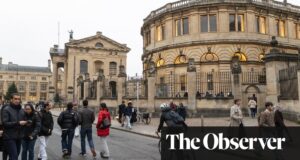
Thank you for your timely reminder about the crises of English literature and the humanities in our universities, including my own (Editorial, 5 December). The closure of the English literature degree at Canterbury Christ Church – the city of Chaucer and Marlowe – is a symptom of a deep malaise across universities and our whole culture.
We should look beyond the actions of particular institutions to an unsustainable financial model and the death cult of economic utility shaping what is studied. We are in a deepening mess – think the state of universities, the climate crisis, the despoliation of nature, fragile representative democracy, war and the slaughter of innocents, and the rise, yet again, of the strong, fascistic leader to bring supposed order into chaos.
Then think Wordsworth and the sense of awe and wellbeing in the presence of vibrant nature. Think Freud in wrestling with the darker sides of humanity and how he turned to myth and Shakespeare to illuminate the murky depths of human sexuality and destructiveness. Think Hamlet and dysfunctional families and government. Think The Winter’s Tale and the character Leontes to illuminate dangerous, hubristic masculinity. And, yes, think Our Mutual Friend and the dustheaps of money and the river to symbolise avarice, predation, death and struggles for integrity. The novel’s social themes of money worship and the treatment of poor people and education could hardly be more resonant today.
Professor Emeritus Linden West
Canterbury Christ Church University
English literature is not a luxury subject, but an essential one that allows us to explore what it is to be human. As the novelist Elizabeth Bowen once wrote: “The process of reading is reciprocal; the book is no more than a formula, to be furnished out with images out of the reader’s mind.”
There are reports that up to 400 staff across Canterbury Christ Church University face redundancy. The dispersal of so much valuable knowledge will create a gigantic vacuum.
Kent has been a highly fertile ground for writers over the centuries, and not just Chaucer and Marlowe. Canterbury Christ Church University collaborated with Jstor Labs to create Kent Maps online, a website devoted to writers who are associated with the county in some way, and has brought to light the neglected fiction of female writers through the International Centre for Victorian Women Writers. To close the English literature department now is to close the door on this heritage.
In extremis, humanity turns to the arts: for example, the poets of the first world war and the inmates of Nazi concentration camps in the second world war. We need the arts, including literature, to nurture ourselves – particularly at times of personal hardship and international conflict. It is a national problem that needs to be addressed urgently. Where is today’s Jennie Lee?
Dr Diana Hirst
Rye, East Sussex




